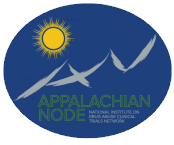News from the Nodes
Appalachian Node
 More than 150 attendees participated in the 32nd Annual West Virginia Addiction Training Institute, hosted virtually by West Virginia University (WVU) on June 14 and 15th. More than 150 attendees participated in the 32nd Annual West Virginia Addiction Training Institute, hosted virtually by West Virginia University (WVU) on June 14 and 15th.
The training covered presentations by 11 speakers on topics including contingency management for Stimulant Use Disorders (SUD), curing hepatitis C in individuals with SUD, and long-acting injectable buprenorphine. Keith Humphreys (Western States Node) from Stanford University, a native of Morgantown, WV, presented one of the keynote trainings on how research can improve public policy and policy changes related to cannabis in Professor Smith Goes to Washington: How Research Can Improve Addiction. He also presented the evidence basis for 12-step mutual support groups, Evidence Supporting the Efficacy of 12-step Programs.
On Day 1 of the training, Judith Feinberg (Node Co-PI) presented You Can Cure Hepatitis C in your Patients with Substance Use Disorders: No Stethoscope Required! With West Virginia currently experiencing one of the worst hepatitis C (HCV) outbreaks linked to injection drug use in the country, Dr. Feinberg emphasizes that HCV is a disease that addiction providers who can write prescriptions can cure if they:
- conduct screening of all their patients for hepatitis B & C, and HIV
- raise awareness among their peers and patients
- utilize good clinical management practices.
In March 2020, Dr. Feinberg led the development of the West Virginia Hepatitis Academic Mentoring Partnership (WVHAMP), a sister to the successful Kentucky program. WVHAMP is a 12-month educational/consultation process that empowers primary care and substance use treatment providers to diagnose, manage and cure HCV in their communities. Other states are working on adapting the model. Dr. Feinberg also encourages providers to seek out other online training resources through telementoring programs, such as Project ECHO.
Ultimately, Dr. Feinberg’s message to providers is the opening statement of her training: "If you can write a prescription- if you are a physician, a nurse practitioner, or a physician assistant- you can cure hepatitis C. If you can’t write a prescription, you can still be a source of knowledge and support to your patients or clients."
Speakers at the training also included two other Node affiliates:
- Laura Lander (Node Co-I) & Katie Chiasson-Downs, Ethics Across the Professions
- Jeremy Hustead (Medical Clinician on CTN 0100), Great Expectations: The promise and reality of long-acting injectable buprenorphine treatment
Find information on upcoming WVHAMP trainings.
Researchers affiliated with the Appalachian Node have also co-authored several papers recently. Find the complete list here. |
Florida Node Alliance
 Congratulations to Florida Node Alliance Investigator, Hansel Tookes, M.D., M.P.H., who received a NIDA Avenir award to develop a new model of care for persons living with HIV/AIDS who inject drugs (PWID). This four-year award will support Dr. Tookes innovative research project, "Tele-Harm Reduction for Rapid Initiation of Antiretrovirals in People Who Inject Drugs: A Randomized Controlled Trial." Tele-Harm Reduction seeks to engage PWID into HIV care by bringing healthcare out of the traditional healthcare system and leveraging syringe services programs as trusted venues to deliver telehealth-enhanced access to antiretrovirals, medications for opioid use disorder, and hepatitis C cure. Congratulations to Florida Node Alliance Investigator, Hansel Tookes, M.D., M.P.H., who received a NIDA Avenir award to develop a new model of care for persons living with HIV/AIDS who inject drugs (PWID). This four-year award will support Dr. Tookes innovative research project, "Tele-Harm Reduction for Rapid Initiation of Antiretrovirals in People Who Inject Drugs: A Randomized Controlled Trial." Tele-Harm Reduction seeks to engage PWID into HIV care by bringing healthcare out of the traditional healthcare system and leveraging syringe services programs as trusted venues to deliver telehealth-enhanced access to antiretrovirals, medications for opioid use disorder, and hepatitis C cure.
Congratulations to Node M-PI, Daniel Feaster, Ph.D., and Node Executive Director, Viviana Horigian, MD, MHA, who along with Sannisha Dale, Ph.D. of the University of Miami, have been awarded a T32 training grant to support the development of an innovative interdisciplinary training program, CHANGE: Culturally-focused Advancements through the Next Generation for Equity. CHANGE includes both a pre-doctoral and a post-doctoral track, and aims to train the next generation of underrepresented (Black, Latinx, and LGBTQ) HIV behavioral scientists with skills to address persistent health disparities in HIV treatment and prevention in Black, Latinx and LGBTQ communities. The CHANGE curriculum includes training in multilevel determinants (e.g., biological, medical, social/structural, psychosocial) of HIV and Mental Health and culturally-focused interventions for prevention and treatment. The program is tied to the University of Miami (UM) Center for HIV and Research in Mental Health (CHARM), an NIMH Developmental AIDS Research Center, and is situated in the UM School of Medicine [Public Health Sciences] and the College of Arts and Sciences [Psychology]. Visit the CHANGE website to learn more.
Protocol Update: CTN-0100
 The first site was endorsed 6/4 and recruitment has started! Adapt (Oregon), Bellevue (New York), Chestnut Ridge Center (West Virginia), Gateway (Florida), Gibson Recovery Center (Missouri), Liberation Programs (Connecticut), Mountain Manor (Maryland), Square Medical Group (Massachusetts), and SSTAR (Massachusetts) are all underway. Huntsman Mental Health Institute (Utah) is expected to begin recruitment in early August. The first site was endorsed 6/4 and recruitment has started! Adapt (Oregon), Bellevue (New York), Chestnut Ridge Center (West Virginia), Gateway (Florida), Gibson Recovery Center (Missouri), Liberation Programs (Connecticut), Mountain Manor (Maryland), Square Medical Group (Massachusetts), and SSTAR (Massachusetts) are all underway. Huntsman Mental Health Institute (Utah) is expected to begin recruitment in early August.
Wave 2 sites begin preparatory activities as of July 1st, with national training planned for the week of August 16-20, and endorsements expected mid-to-late October. Wave 2 sites are: Aspire Health Partners (Florida), Dartmouth-Hitchcock ATP (New Hampshire), Operation PAR (Florida), University of Pittsburgh (Pennsylvania), Shoreline (South Carolina), Tarzana (California), CAST at UAMS (Arkansas) and ASAP at UNM (New Mexico).
For study information, please contact RDD at rdd@nyulangone.org. |